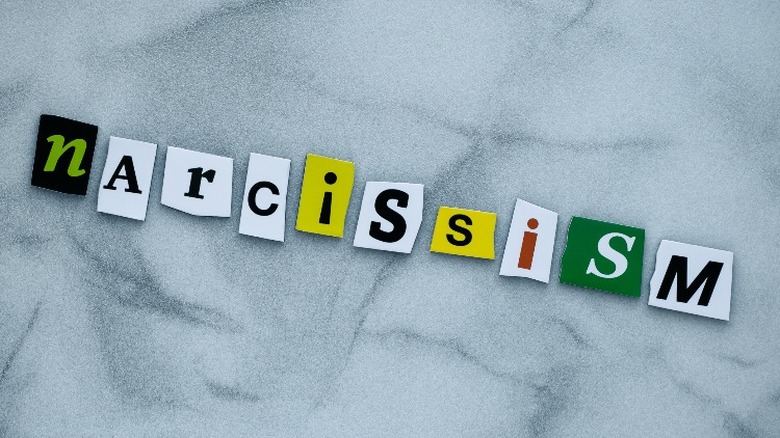Sociopath Vs. Narcissist: What's The Difference?
With conversations happening more frequently around mental health awareness, it feels like terms such as "narcissist" and "sociopath" are popping up everywhere in daily jargon. You may think your significant other is a narcissist, or maybe your neighbor acts like a total sociopath.
The truth is, people often use these terms without realizing what they actually mean. In some instances, they even use the words interchangeably. However, there are several key differences between a sociopath and a narcissist. Furthermore, it requires someone possessing several (very specific) personality traits to even get a clinical diagnosis of Narcissism Personality Disorder (NPD) or Antisocial Personality Disorder (APD), which is the official term for sociopathy.
Like with many personality disorders, narcissism exists on a spectrum. For someone to be diagnosed with NPD, however, they must possess at least five out of nine criteria. Similarly, for someone to be diagnosed with APD, they must also meet a checklist of criteria, as well as have a conduct disorder by 15 years old, according to Psychology Today. So what are these criteria for both of these disorders? How do they differ from one another?
Several criteria constitute NPD
Every mental disorder we know of is classified in a publication called the Diagnostic and Statistical Manual of Mental Disorders (DSM). It is published by the American Psychiatric Association (APA) and provides ubiquitous language and standard criteria for the benefit of doctors, therapists, researchers, and pharmacy companies (per the American Psychiatric Association). The latest version of the DSM (the DSM-5) was published in 2013 and provides the diagnostic criteria for both Narcissistic Personality Disorder and Antisocial Personality Disorder.
A diagnosis for NPD requires at least five of the following traits to be present: 1. Suffers from delusions of grandeur; 2. Fantasizes about endless power, success, beauty, and so on; 3. Lacks empathy for others; 4. Needs constant admiration; 5. Acts arrogant; 6. Is envious of others, or assumes others are envious of them; 7. Believes they are special and can only associate themselves with other "special" people or institutions; 8. Unreasonably demands favorable treatment, and believes others should easily adhere to their wishes; 9. Exploits or manipulates others to meet their personal end goals (per Psychology Today).
There are several classifications of narcissists, including "Exhibitionist Narcissists" (aka the typical narcissist that comes to mind when you think of the term), and "Inhibited Narcissists," or closeted narcissists. Those who exhibit all of the aforementioned characteristics often and to a high degree are called "Malignant Narcisists." Similarly, there are narcissists who experience the symptoms to a lesser degree and even possess guilt, and remorse, as well as an ability to love.
APD is diagnosed differently than NPD
Antisocial Personality Disorder, like Narcissistic Personality Disorder, is long-standing and prevalent throughout every part of one's life. APD, however, tends to be more difficult to treat (though psychotherapy may be beneficial in the long run), according to Mayo Clinic.
So what are the criteria needed to diagnose APD? A conduct disorder must be present in childhood or early adolescence. Symptoms of a conduct disorder include: 1. Acting aggressively towards people and animals; 2. Destroying property; 4. Being deceitful; 5. Stealing; 6. Seriously violating rules (per Mayo Clinic).
On top of the early-life conduct disorder, at least four of the following traits are necessary for a clinical diagnosis: 1. Does not maintain consistency in school or work; 2. Is not able to conform to social norms (i.e. following the law); 3. Dismisses truth by pathologically lying, using aliases, or conning; 4. Impulsive and incapable of planning for the future; 5. Irritable and aggressive/violent; 6. Reckless when it comes to the safety of themselves and/or others; 7. Perpetually irresponsible; 8. Remorseless when hurting, mistreating, or stealing from others; 9. Does not have monogamous relationships for more than one year (via Psychology Today).
Certain symptoms of APD (specifically, destructive and criminal behavior) may decrease over time in some people, although it's unclear if that is because of aging or an increased awareness of the consequences that comes with the antisocial behavior (via Mayo Clinic).
There are differences, but also similarities between APD and NPD
After reviewing the symptoms and criteria for both disorders, it's apparent that Antisocial Personality Disorder and Narcissistic Personality Disorder are quite different. However, there are some personality traits that cross over between the two. For starters, people suffering from either NPD or APD can possess qualities such as charisma, intelligence, and charm. They can also be controlling, selfish, dishonest, and unreliable, per Psychology Today.
Furthermore, people with either disorder can share an exaggerated positive perception of themselves, as well as a sense of entitlement. NPD and APD can also cause a denial of responsibility for one's abusive behavior, and a lack of insight, empathy, and emotional responsiveness. Still, while sociopaths can qualify as narcissists, not all narcissists suffer from sociopathy, and some key differences between the two exist.
For starters, their motivating factors differ, and sociopaths are generally more cunning because they don't move with their ego. In fact, sociopaths don't have much personality at all, which makes them more covert. They may even focus their attention on others if it helps them fulfill their end goal.
Narcissists, in contrast, are easier to spot, and less calculating. They are also more likely to work harder for their recognition and success, whereas sociopaths might take the easier way by lying and stealing. Overall, narcissists tend to be more concerned with others' perception of them, making them not only codependent on others, but more susceptible to manipulation, says Psychology Today.



